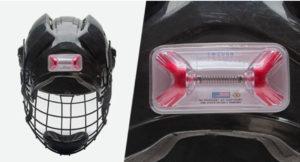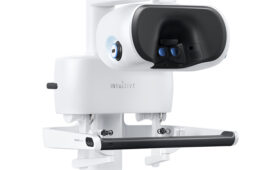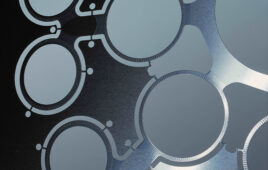
Tozuda’s mechanical concussion sensor attaches to a helmet. (Image from Protolabs)
Jessie Garcia suffered her share of concussions as a student athlete. The last one got her to thinking.
Garcia was playing rugby for Lehigh University in 2009 when an opposing player hit her hard. Garcia felt OK, but her coach noticed the hit in a video a few days later and advised her to see a doctor. Sure enough, Garcia had a concussion. She and her rugby team started wondering if there was a better way to detect them — one that wasn’t as expensive as the “connected” mouth guards that have smartphone apps and other devices on the market.
There wasn’t, so Garcia designed her own. It’s named Tozuda, after her grandmother’s nickname for her. (Tozuda means “hard-headed” or “stubborn” in Spanish, and is also the name of her Philadelphia-based company.)
Tozuda’s solution is mechanical. It uses a compressed spring and ball bearings that keep dye tucked away in reservoirs on either side of the device. When an impact of sufficient force happens, the spring and bearings dislodge and dye spills into a chamber, causing the device to turn red. The color change it indicates the possibility that a concussion has occurred and the user should be evaluated medically for a possible traumatic brain injury (TBI). (Only a licensed medical professional can diagnose a concussion.)
Tozuda turned to Protolabs to manufacture the parts that make up the device’s frame. During the prototyping phase, Garcia and her team used 3D printing and CNC machining, but injection molding turned out to be the most cost-effective way to mass-produce the parts they needed and still achieve scale in a timely manner.
Protolabs manufactured three parts for Tozuda. The cover is made from transparent polycarbonate plastic that makes the detection system clearly visible. The base, where the device attaches to a helmet, is rugged ABS plastic. Between the two are critical internal components made from flexible liquid silicone rubber (LSR). These hold the spring and ball bearings in place, and keep the dye tucked away in their reservoirs.
Tozuda’s catchphrase, “If it’s red, check your head,” is a nod to the simple system built into the device to detect linear and rotational force. It also reminds users that only a medical professional can diagnose a concussion.
Protolabs recently gave Tozuda one of its seven “Cool Idea” awards for 2019. Beyond the honor, the award includes the manufacturing services for the initial order. In Tozuda’s case, that was worth $27,000. For the Tozuda team, what mattered most was quality and speed.
“We love how fast Protolabs turned around our quotes and parts,” Garcia said in a news release. “Once we submitted part files online, our Protolabs contacts kept us informed with calls and emails clarifying what their engineering teams needed so we knew we would get the exact parts we were looking for.”
The latest iteration of Tozuda hits the market later in 2020.




